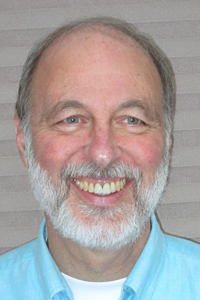Give Yourself the Gift of Memory
Author: Bob Baugher
"How long has it been?"
Bereaved people are often asked this question. I ask it of you. How long has it been? Now answer this question. How long does it feel like it's been? A common answer is, "On one hand it feels like yesterday. On the other, it feels like a long time ago."

Why do we experience our lives like this? How can something five or ten years ago feel recent, yet something that occurred last week can feel forever ago? You hear it all the time. Life is short. Time goes by so fast. It seems like only yesterday that …
One way to think of memories is to put them in terms of nouns, then verbs. What are the memorable nouns in your life: the persons, places, and things? And what did you do with, to, or for these folks? What did you do in the places you went? What did you do with the things in your life?
Another way to categorize memories is in terms of the senses involved: sights, smells, tastes, touches, and sounds. In other words, we can categorize life memories in terms of the information taken in by our senses about what we did with, to, or for the people, places, and things in our lives.
Why We Forget
Let's say that you've lived twenty, forty, or more years. Why don't you have millions of memories at your disposal? One reason is because your mind works efficiently to store events into categories. For example, let's say that every year for the past ten years you went on vacation at the same ocean location with the same people. You drove the same route, rented a room at the same place, played on the same beach, made similar sand castles, watched TV, played games, and did much of the same things. Ten years of this would likely get categorized by your brain as one or perhaps a few events at the beach. Unless, of course, something different-distinctive-happened to make it memorable.
Flashbulb Memory
An example of this is what psychologists call flashbulb memory. It happens when a unique and significant event suddenly is thrust into our lives: September 11, the death of a loved one, winning a championship game, the moment we learned we got our first job. One theory why traumatic events and extremely joyous events are so ingrained in our memories is that the sudden upsurge of adrenaline permanently etches the event into long-term memory.
It's as if a self-protective mechanism is hard wired in your brain in an attempt to protect itself from future harm or to forever retain a cherished moment. In the face of what it deems a significant event, your brain commands, "You will not forget this, even if you try." Thus, remembering flashbulb events takes no effort.
The Brain and Memory
What we have with the human brain, therefore, is an efficient organ that categorizes most events into mundane soon-to-be-forgotten life experiences, because they are of little consequence. But as a protective device, this same organ automatically stores events that exceed the boundaries of common experience. What does this tell us about our own memories? Of course, we can't make every event in our life memorable. But there is something we can do. We can find ways to retrieve less distinctive life events.
Types of Memory
There are different kinds of memory. One type, short-term memory, can begin to fade after a few seconds or minutes and may be completely gone after a half hour. Quick. Go back to exactly one week ago and try to remember brushing your teeth that morning. Go back exactly one month ago and conjure up eating your evening meal. Here comes the obvious reason for your lack of memory: unless there was something distinctive about the event, it's gone.
The other type of memory is long-term memory. It is stored in our brain and will stay there unless it fades over time. We do have memories of events stored long ago that can be retrieved if only we have the proper triggers.
Retrieving Memories
Let’s look at the concept of time and try to make some sense of it. Scientists tell us that time can be measured in two ways. One is by a unit of measurement such as seconds, days, or years. For example, how old are you? Virtually everybody answers this question in years. Another way to measure time is by events. How many events of your loved one’s life do you remember? How vivid are they? What are the triggers of these memories? As the months and years pass, many people fear forgetting events in their loved one’s life.
I have a suggestion to help you call up positive memories whenever you wish.
- Take out a pen and paper and write a list of every memory that immediately comes to mind. Don't worry about details for now. Just write.
- Find a label for each of the memories.
- Go through each memory and create as much detail as possible. Describe the setting, what was said, colors, temperature, smells, sounds, touches. Make a story out of the event.
- Assign a number to each label.
- Practice saying a number and immediately bringing up the full memory of the event. Practicing this for a few days can create a very powerful list of quite wonderful memories that you can access at will. The numbered list can be carried on a 3″x5″ card for easy referral.
Picture a father standing in line at the grocery store. His son died two years ago, and he has recently put together a list of ten of his favorite memories. As he stands in line, he says to himself, “I’m going to think about number five for a few seconds.” He associated this number with the time he and his son took windsurfing lessons at the lake. He sees his son being shown the fundamentals by the instructor, practicing on land, bending his knees, shifting his weight, getting into the water, climbing on the board, and attempting to stand. He smiles as he sees both his son and himself fall off the board again and again. He nods at the beautiful scene in his mind of his son proudly standing and gliding across the water with the sun and blue sky in the background. He reaches the checkout, pays his bill, and walks out of the store somewhat comforted by a memory he knows he can bring up whenever he wants.
Give this technique a try, but be careful not to get upset if you don’t have crystal clear memories. Think of a time in your loved one’s life and use the steps above to create your story from the memories you have.
Our brain functions in such a way that we are aware of the passage of time and we understand that some memories are “older” and more distant than others. However, if we practice bringing up memories from time to time, we can reinforce the images and transcend the time gap between then and now.
Of course, focusing exclusively on the past and ignoring the present is not healthy. But as you know, memories are all you have. Why not use them?
 By Bob Baugher, PhD: Bob is an instructor at Highline Community College, where he teaches courses in psychology, death education, human relations, and suicide intervention. He has given workshops on grief and loss across the United States, England, South Africa, and Namibia. He earned his certificate in Thanatology from the Association for Death Education and Counseling and in the 1990s he was a clinician with University of Washington School of Nursing Parent Bereavement Project. Bob has written eight books on the bereavement process.
By Bob Baugher, PhD: Bob is an instructor at Highline Community College, where he teaches courses in psychology, death education, human relations, and suicide intervention. He has given workshops on grief and loss across the United States, England, South Africa, and Namibia. He earned his certificate in Thanatology from the Association for Death Education and Counseling and in the 1990s he was a clinician with University of Washington School of Nursing Parent Bereavement Project. Bob has written eight books on the bereavement process.
